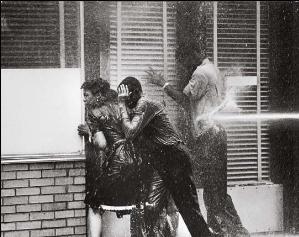Letter from Birmingham Jail, and Theater
Isaiah here.
As I try to do on this day every year, I read through what I (along with Isaac Butler) think may be the greatest American argumentative essay, MLK's Letter from Birmingham Jail, written to white, moderate clergymen reluctant to support his work protesting segregation.
The wonderful thing about returning to a familiar text on a regular basis -- something Jewish readers may be familiar with, with our Torah divided as it is into 52 bite-sized weekly portions -- is the way that each fresh re-read allows for new, deeper meanings. A little over a year ago, Perry v. Schwarzenegger kicked off another round of the increasingly less interesting "is it too soon for America to accept gay marriage?" debate. King's words echoed across the decades:
For years now I have heard the word "Wait!" It rings in the ear of every Negro with piercing familiarity. This "Wait" has almost always meant "Never." We must come to see, with one of our distinguished jurists, that "justice too long delayed is justice denied."Scathing stuff, even 45 years later. And since this time last year, Prop 8 was struck down; DADT was repealed; NY improv artists, the President of the United States, and even Kermit the Frog told bullied gay teens that It Gets Better (15 million views and counting!). As King himself later said to a different group of clergymen, the arc of the moral universe is long, but it bends towards justice.
...There comes a time when the cup of endurance runs over, and men are no longer willing to be plunged into the abyss of despair. I hope, sirs, you can understand our legitimate and unavoidable impatience.
This year, though, another pair of passages jumped out at me. King's nonviolent protest movement had come under fire for "causing tension" and he had been labeled an "agitator." He responded (emphasis added):
I must confess that I am not afraid of the word "tension." I have earnestly opposed violent tension, but there is a type of constructive, nonviolent tension which is necessary for growth. Just as Socrates felt that it was necessary to create a tension in the mind so that individuals could rise from the bondage of myths and half truths to the unfettered realm of creative analysis and objective appraisal, so must we see the need for nonviolent gadflies to create the kind of tension in society that will help men rise from the dark depths of prejudice and racism to the majestic heights of understanding and brotherhood.These sections made me think about Gus' fascinating grappling on this blog with the intertwined theatrical values: Presence and Imaginative Empathy, particularly his most recent post on the latter topic, exploring the relationship between political speech and art, and the responsibilities of both towards the maintenance (or destruction) of our social fabric.
...Actually, we who engage in nonviolent direct action are not the creators of tension. We merely bring to the surface the hidden tension that is already alive. We bring it out in the open, where it can be seen and dealt with. Like a boil that can never be cured so long as it is covered up but must be opened with all its ugliness to the natural medicines of air and light, injustice must be exposed, with all the tension its exposure creates, to the light of human conscience and the air of national opinion before it can be cured.
 As artists seeking to help audiences achieve an Aristotelian catharsis, using the tools at our disposal -- namely, Presence and IE -- are we not engaged in the work of bringing hidden tension to the surface, so as to encourage growth and change? There was always a theatrical element to the nonviolent protest movement, and I say that in the kindest, most self-flattering sense of the word. Who could look at the images of peaceful men and women chased by dogs and blasted by firehoses for daring to sit down at the wrong lunch counter, and not think: "here is a drama, with protagonists I can identify with, with antagonists I recognize from the darkest places inside myself, and this drama is unfolding in my country, right now"? MLK made a distant idea (segregation) real and threw it in the nation's face. He made injustice Present, and a year after writing his letter stood behind Lyndon Johnson, watching him sign the Civil Rights Act.
As artists seeking to help audiences achieve an Aristotelian catharsis, using the tools at our disposal -- namely, Presence and IE -- are we not engaged in the work of bringing hidden tension to the surface, so as to encourage growth and change? There was always a theatrical element to the nonviolent protest movement, and I say that in the kindest, most self-flattering sense of the word. Who could look at the images of peaceful men and women chased by dogs and blasted by firehoses for daring to sit down at the wrong lunch counter, and not think: "here is a drama, with protagonists I can identify with, with antagonists I recognize from the darkest places inside myself, and this drama is unfolding in my country, right now"? MLK made a distant idea (segregation) real and threw it in the nation's face. He made injustice Present, and a year after writing his letter stood behind Lyndon Johnson, watching him sign the Civil Rights Act.Does all theater live up to King's ideal of a tension-revealing, boil-lancing growth engine? No. But I think, maybe, that all GOOD theater aspires to it.
And aspiration, after all, is just another word for the breath of life.
Readers, what passages stick out for you this year, from this or any other of King's work?




0 comments »
Post a Comment